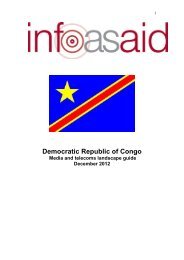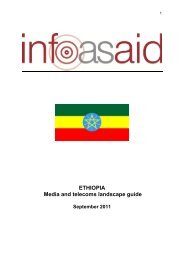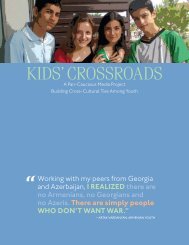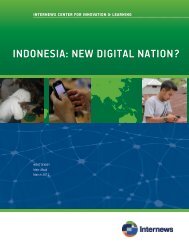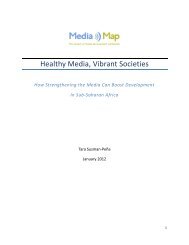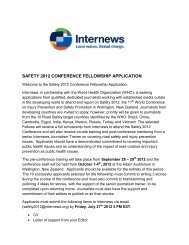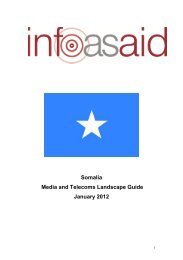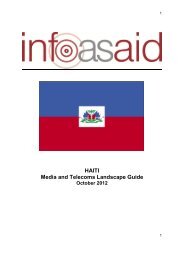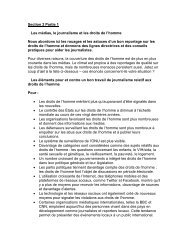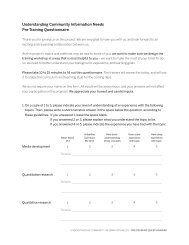STArTInG A LOCAL RADiO stAtiOn - Nai
STArTInG A LOCAL RADiO stAtiOn - Nai
STArTInG A LOCAL RADiO stAtiOn - Nai
- No tags were found...
Create successful ePaper yourself
Turn your PDF publications into a flip-book with our unique Google optimized e-Paper software.
Section 7: ethics and media lawNational Radio Television Afghanistan Commission serves the following functions:nnnnUpholds and protects the ethical standards and reputation of the NRTAMonitors and implements NRTA’s budgetImplements broadcasting policy as established by the High Media CouncilProduces an annual activity report of RTA for the Mass Media CommissionPROHIBITIONS AND PROVISIONSThe Media Law consists of provisions and prohibitions for Afghan journalists and managers of mediaorganizations that guide financial management, licensing procedure, programming content, and complaintsprocedures.What is freedom of speech?The Constitution of Afghanistan declares the Afghan Media Law as a separate legislation; nevertheless,the Constitution contains articles important to freedom of speech and the media. These include:• Article 34—The right to freedom of expression and the right to express opinions without priorsubmission to state authorities.• Article 7—Obliges Afghanistan to abide by the Universal Declaration of Human Rights to whichit is a signatory.Freedom of expression supports a functioning democracy through the pursuit of truth and the freedomfor members of society to express opinions and views. Freedom of expression also includes the freedomof the media to receive and disseminate information and encourage public dialogue. Article 19 of the UniversalDeclaration of Human Rights recognizes the principle of press freedom as the right to seek, receiveand impart information.Article 4 of the Media Law states:“Every person has the right to freedom of thought and speech, which includes the right to seek, obtain and disseminateinformation and views within the limit of law, without any interference, restriction and threat by thegovernment or officials. The right also includes free activity of means of publication, distribution, and receptionof information.”Are there limitations to freedom of expression in Afghanistan?There are eight “prohibited” materials specified in Article 45 of the Media Law, which place boundarieson what can be produced or broadcast in Afghanistan:1. Works and materials which are contrary to the principles and provisions of the holy religion of Islam.2. Works and materials which are offensive to other religions and sects.3. Works and materials which are defamatory, insulting and offensive to real or legal persons.4. Works and materials which are considered libelous/defamatory to real and legal persons and causedamage to their personality and credibility.80 STARTING A <strong>LOCAL</strong> RADIO STATION: A MANUAL FOR AFGHANISTAN



